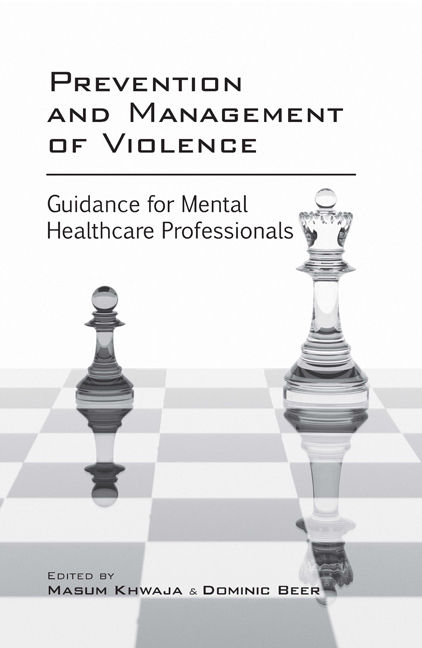Book contents
- Frontmatter
- Dedication
- Contents
- Abbreviations
- List of boxes and tables
- Working group
- Executive summary and recommendations
- 1 Legislation relevant to the management of violence by persons with mental disorders
- 2 Safeguarding vulnerable adults and children exposed to violence
- 3 Risk assessment and management
- 4 Risk prevention and non-pharmacological management of violence in acute settings
- 5 Use of medication and ECT in the management of violence
- 6 Post-incident management
- 7 Management of the risk of violence in the community
- 8 Management of violence in older adults
- 9 Management of violence in people with intellectual disability
- 10 Management of violence in prisons
- 11 Liaison with the police, Crown Prosecution Service and MAPPA
- 12 Information-sharing with victims of crime committed by persons with mental disorders
- 13 Clinical governance
- Appendix Organisations that victims of crime can contact
- Index
- Frontmatter
- Dedication
- Contents
- Abbreviations
- List of boxes and tables
- Working group
- Executive summary and recommendations
- 1 Legislation relevant to the management of violence by persons with mental disorders
- 2 Safeguarding vulnerable adults and children exposed to violence
- 3 Risk assessment and management
- 4 Risk prevention and non-pharmacological management of violence in acute settings
- 5 Use of medication and ECT in the management of violence
- 6 Post-incident management
- 7 Management of the risk of violence in the community
- 8 Management of violence in older adults
- 9 Management of violence in people with intellectual disability
- 10 Management of violence in prisons
- 11 Liaison with the police, Crown Prosecution Service and MAPPA
- 12 Information-sharing with victims of crime committed by persons with mental disorders
- 13 Clinical governance
- Appendix Organisations that victims of crime can contact
- Index
Summary
Organisations and individuals have a responsibility to consider how to prevent and manage aggression and violence in accordance with relevant legislation and national best practice guidelines.
There have been three previous documents produced by the Royal College of Psychiatrists on the management of violence:
1 Strategies for the Management of Disturbed and Violent Patients in Psychiatric Units (Council Report CR41; Royal College of Psychiatrists, 1995)
2 Management of Imminent Violence: Clinical Practice Guidelines to Support Mental Health Services (Occasional Paper OP41; Royal College of Psychiatrists, 1998)
3 Good Medical Practice in the Psychiatric Care of Potentially Violent Patients in the Community (Council Report CR80; Royal College of Psychiatrists, 2000).
In revising Council Report CR80, the Working Group amalgamated relevant aspects of the documents mentioned above, and appraised new evidence since the publication of National Institute for Health and Care Excellence (NICE) guidelines on the short-term management of disturbed/violent behaviour in psychiatric in-patient settings and emergency departments (National Institute for Health and Clinical Excellence, 2005). The revised College report provides an overview of good practice in the prevention and management of violence of patients with mental disorder.
In reflection of the multidisciplinary nature of the management of violence, membership of the Working Group tasked with producing the guidelines was itself multidisciplinary and included psychiatrists from forensic, older adult, learning disability, and general adult specialties as well as colleagues from nursing, psychology and pharmacology backgrounds.
The final document was appraised by the College's Central Policy Committee, whose membership includes carer and service user representatives.
Recommendations
1 We support the Zero Tolerance campaign against violence in the National Health Service (NHS). Organisations and individuals should not tolerate violence as an everyday, unavoidable reality of mental health services. Although incidents of violence cannot always be prevented or anticipated, a robust and considered response to incidents of violence and aggression will help to ensure a safe and more secure environment for staff, patients and carers.
2 Risk assessment is an integral component of psychiatric practice.
3 A structured clinical judgement approach to assessing the risk of violence is recommended.
4 Effective communication within the multidisciplinary team, with patients and carers, and the relevant outside agencies is an essential part of any risk management plan.
- Type
- Chapter
- Information
- Prevention and Management of ViolenceGuidance for Mental Health Professionals, pp. xiii - xviPublisher: Royal College of PsychiatristsFirst published in: 2017

